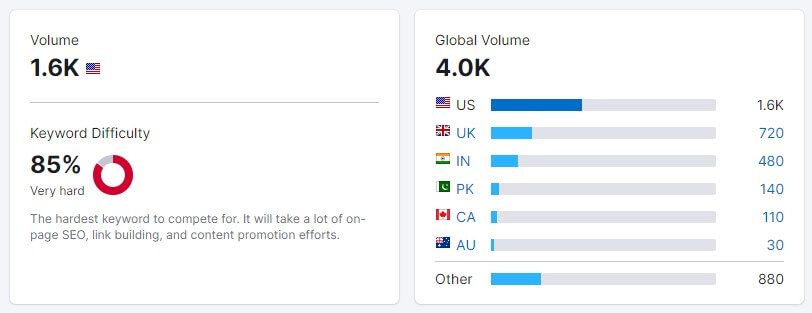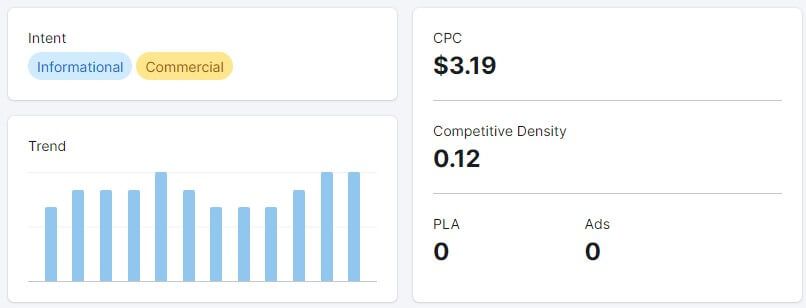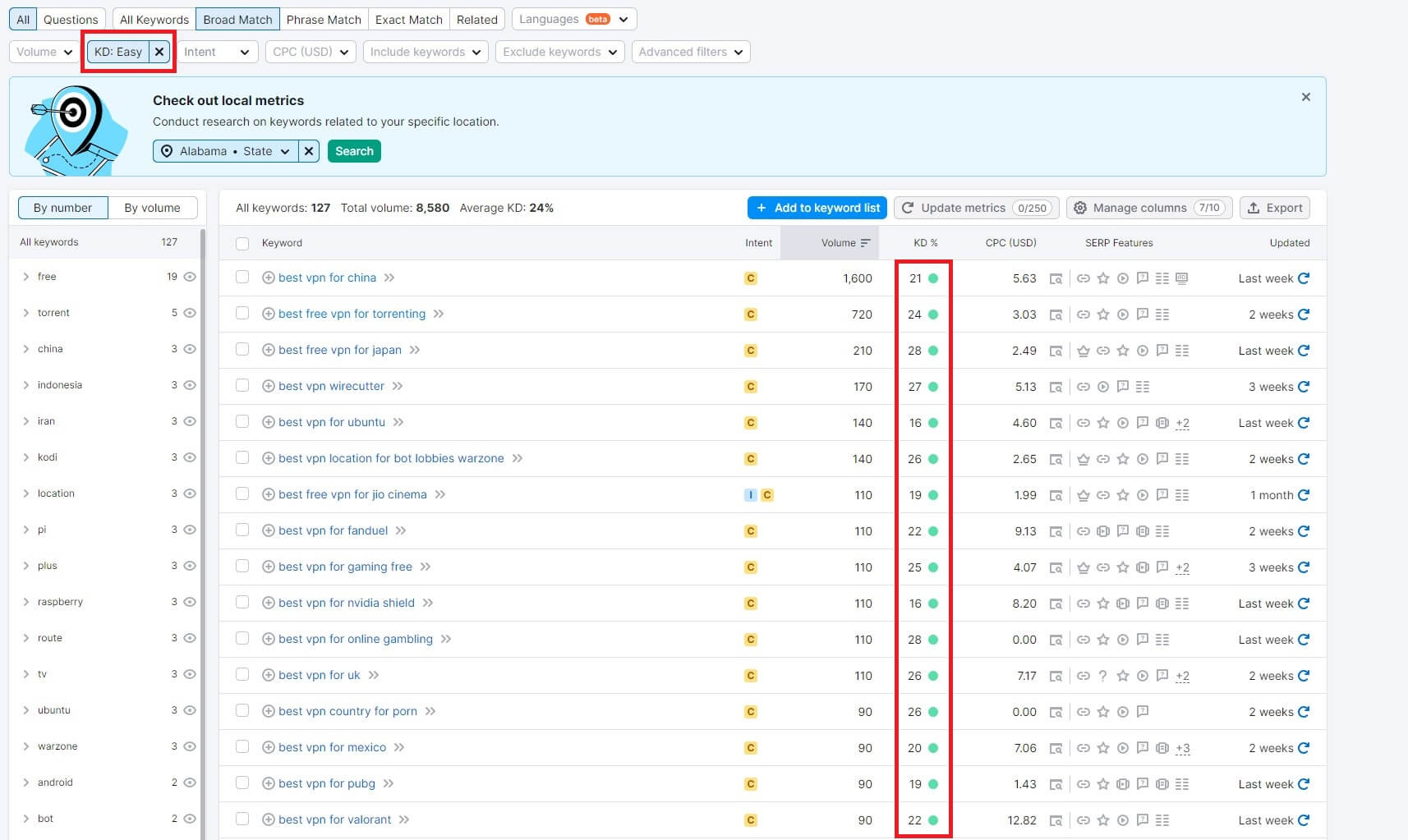SEO discussions often revolve around proper keyword implementation. Knowing what SEO keywords are is crucial when looking to improve your ranking and get more traffic. However, it’s not only about knowing what they are. This is only a minor step.
You need to know what they mean for your ranking, how to implement them, and acquaint yourself with keyword-related qualities. In today’s article, we will go over all the information you’ll find useful when asking yourself what are keywords and why are they important for SEO.

What Are SEO Keywords?
Let’s start from the beginning. When you search for something online, you type in a specific query. That query represents a keyword, also known as:
- SEO keyword,
- keyphrase,
- or search query.
In simple words, an SEO keyword is the phrase you type in the search engine when looking to find information on a topic.
Another thing to clarify is that the keyword isn’t necessarily one word. As said previously, it can be a phrase.
It doesn’t matter if the query is “best VPN in the world” or just “VPN” – both are considered keywords. However, they’re very different and will display different search results, as the first one is more specific.
Now, in the SEO world, they have a very important role. These phrases are used by Google or any other search engine to rank the page or website in SERPs (Search Engine Results Pages) for the specific keyphrase.
Why Are Keywords So Important for SEO?
With this SEO keywords explanation, we can assume one thing – they’re VERY important. The word “very” is an understatement.
SEO and PPC campaigns vastly depend on proper keyword implementation, which we’ll go over a bit later.
Generally speaking, it’s vital to optimize the page around the key phrases that people search for the most. In return, the site or the page will rank better, thereby, receiving more visitors. If your website is about VPNs, you want your keywords to revolve around them.
This way, you’ll attract the traffic you want and get people who worry about cybersecurity to visit your website. Now, if a site is about VPNs and in theory, keywords revolve around kitchen appliances, this discordance will attract “wrong” visitors.
The key, therefore, is to somehow get into the minds of your potential visitors and see what they want. Luckily, you don’t have to do that on your own. Semrush and its Keyword Magic Tool and Keyword Research will let you get new keyword ideas in a few seconds.
With these tools, you’ll be able to disperse the keywords that will instantly boost your ranking. Better yet, they’ll help people who search for your niche find the required information or purchase the product you’re selling.
SEO Keywords Qualities Explained
After finding out what are SEO keywords, the natural question would be how to get and use them.
Well, that can’t be explained until we look at their qualities. These qualities are, in a way, parameters, that describe keywords more closely. We go over them below.
Search Volume
Search volume is the basic parameter that will tell you whether the specific SEO keyword is worth doing. Semrush is, in our opinion, the most accurate in this regard. It’ll show you the amount of potential traffic you’ll get if you rank for that keyword.

This can be found by typing the phrase and getting the search volume globally or in specific (chosen) countries. If the volume is low, it means the keyword doesn’t attract many searches, and in most cases, it’s not worth doing – in most, not always.
However, phrases with higher search volume will likely attract more visitors. On the contrary, it will be more difficult to rank for, which might not be great for new websites looking to climb their way up the SERPs on Google, Bing, or other search engines.
Difficulty/Competition
SEO keyword difficulty is another important parameter, as it indicates how strong the competition is for that phrase. Some of the top SEO tools like Semrush display this perfectly by using the Difficulty and Competition parameters.
The Difficulty parameter signals how hard it’ll be to rank in the top 10 SERPs for the keyword in question. On the other hand, the Competition (Competitive Density) parameter tells you how competitive the keyword is if you’re looking to rank an ad for that keyword in the top 10 SERPs.
Search Intent
Another thing we value in Semrush is its search intent parameter. Simply put, search intent tells you why users are searching for a specific keyword. Search intent can be:
- Transactional
- Commercial
- Informational
- Navigational
The transactional intent means users are looking to make a transaction i.e. buy a product. Then, we have the commercial intent. In this case, users are researching products and sifting through various options before making a final purchase.

The Informational search intent means users are looking for information. This search intent isn’t leading to a purchase. It indicates that users need to solve a problem. Finally, there’s the navigational search intent, in which case, users intend to go to a specific website.
If you type in “Elon Musk Facebook”, you likely want to navigate to Facebook and find out Elon Musk’s page. This is an example of a navigational search intent. Regardless, understanding search intent is important for improving SEO keywords distribution.
If your goal is to sell a product, you’ll want to implement transactional keywords, for instance. Even SE Ranking will display this parameter in its Keyword Research tool, making it a vital choice for this purpose.
CPC (Cost Per Click)
When discussing what are SEO keywords, we need to mention CPC. It’s an important parameter of keywords that tells us how much an advertiser pays each time someone clicks on the ad after that person searches the keyword.
Let’s say, the CPC for the keyword “VPN” is $4.2, according to Semrush. When someone searches this keyword and clicks on an ad, the advertiser will pay $4.2 for that and every other visitor who does the same.
Websites that want to make money from CPC keywords will likely prioritize those with higher CPC. Albeit, these keywords are often harder to rank for, as they’re more competitive and sought after. But think about it – it’s another important quality of SEO keywords.
Word Count
One more thing regarding keywords for SEO is their word count. This parameter refers to the number of words the keyword consists of. For the “VPN” keyword, the word count is one. However, if the phrase is “VPNs for safety and security”, the word count is five.
What does this tell us? Well, it’s all about being specific. The first case is a “broad” term that can refer to any VPN. However, the latter case refers to VPNs specifically made for online safety and security. Longer keywords usually have lower competition levels.
They’re very specific and in many cases, can lead to a decision to make a purchase. Sometimes, it’s better to focus on these keywords, as weaker competition density often leads to lower difficulty, making it easy to rank for them.
How to Find Keywords?
Speaking of ranking for SEO keywords, we’ll briefly go over the question of how to find keywords for SEO.
We have a separate guide on the best keyword research tools where we discuss this subject more in-depth.
In this guide, we’ll give you a broad overview of how you can find the appropriate keywords. First, you want to focus on the important parameters we discussed previously. When you use the Keyword Research tool in Semrush, take a good look at them.
If the volume is high enough, the difficulty is moderate, and the CPC is as high as you want it to be, chances are the keyword is worth ranking for. Next, it’s time to check the search intent and see why people search the keyword to properly adapt the content.
Long-Tail Keywords
Another tip we can give you is to focus on long-tail keywords. This is especially important for new websites that will find it impossible to rank for extremely competitive phrases. An example would be the “SEO” keyword – a very “general” term.
Its difficulty is 100% in Semrush and its volume is huge – around 165K only in the US. With the difficulty of 100%, you won’t have a chance to rank for it. However, a long-tail keyword is related to the keyword you’re targeting but is more specific – like “SEO for beginners.”

On top of that, their volumes are lower and according to Semrush, they usually convert better than high-volume phrases. The Keyword Magic Tool from Semrush is handy for this purpose, as it will display long-tail keywords with their qualities.
Identifying and implementing them will inevitably bring in more visitors looking to purchase a product based on a specific search query. Tools like Semrush and SE Ranking offer a variety of tools for finding SEO keywords.
With them, it’s easy to create topic clusters and get inspiration in the form of new phrases to include in your pages. Not to mention Keyword Gap which displays the high-ranking keywords your competitors rank for but your domain doesn’t, giving you the option to use these key phrases and close the gap.
LSI Keywords
LSI or Latent Semantic Indexing keywords should also be your focal point. They’re related to the main keyword and help describe the topic more precisely. If a page is about SEO tools, LSI keywords like:
- Keyword ideas,
- Local SEO,
- Free tool,
- Google Search Console and many others will be great.
Semrush’s SEO Content Template lets you get LSI keyword ideas promptly, with advice on backlinks and recommended text length based on the SEO phrases in question. Ensuring you have a wealth of LSI phrases will aid Google in identifying your site properly.

Talking about VPNs and mentioning security, privacy, Netflix, geo-blocks, and so on will make Google identify you as a cybersecurity site. However, LSI keywords are usually naturally implemented without much effort, so want it or not, you’ll likely have plenty of them.
How to Use Keywords Properly?
Less is sometimes more and that especially rings true for many SEO tactics. Dispersing keywords without any sense makes the page or article look and sound pathetic. There’s something called keyword stuffing – you know what it is.
When you use SEO keywords too frequently, it makes the page sound unnatural and “pushy.” It’s as if you want to rank higher SO bad that you just spam key phrases without end. Don’t do it. It’ll just produce the opposite effect and rank you lower in SERPs.
Just focus on natural implementation and ensure the keyword appears in your URL, H1 title, meta description, and SEO title. Keyword density should be around 1-3% according to many SEO experts, which means only 1-3% of your page should be key phrases.
This includes keyword placement in H2-H6 titles, where these phrases should also be found. Additionally, focus on having a good keyword variety. This means using long-tail and LSI keywords as well, in addition to your main phrase.
One last tip we have is to use the targeted phrase in alt titles or alt text. Alt text better describes the image and its context, which can be meaningful for improving your SEO.
SEO Keywords: The Final Verdict
At the end of our discussion, let’s revisit the question of what keywords are and why they are important for SEO.
The definition is logical when you know these phrases are used to search for something online. Each phrase or word you type in the search bar is considered a keyword.
It’s no wonder many are looking for search engine optimization keywords, as they allow Google and other search engines to rank sites and pages. When it comes to their implementation, the subject is too deep and wide to go into specifics.
One thing is clear – avoiding stuffing and focusing on low-tail keywords are some of the best tactics. On top of that, finding keyword ideas is easy with software like SpyFu and Semrush but also SE Ranking and many others.
Using some of these tools is pivotal and doing things manually likely won’t get you far. Now that you know what are SEO phrases, how they function, and why they’re so meaningful, you should be well-equipped to take action and spearhead your site to success.